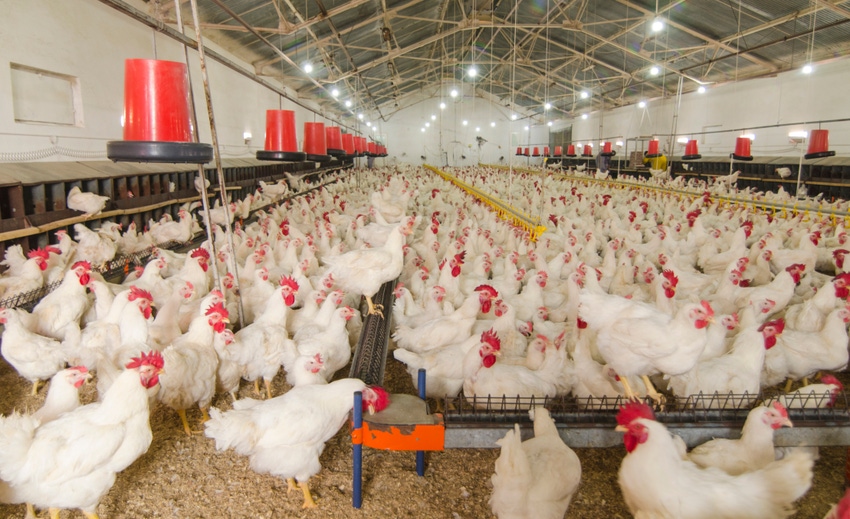UConn-led project aimed at developing integrated and sustainable program for antibiotic-restricted broiler production.
August 7, 2020

The U.S. Department of Agriculture's National Institute of Food & Agriculture (NIFA) has announced a competitive award of $10 million to a project aimed at developing an integrated and sustainable program for enhancing the viability of antibiotic-restricted broiler production in the poultry industry, according to the University of Connecticut (UConn).
The project will be led by Kumar Venkitanarayanan, UConn College of Agriculture, Health & Natural Resources associate dean of research and graduate education and professor of animal science.
Venkitanarayanan explained that actions by the Food & Drug Administration to phase out antibiotic growth promoters poses challenges for the industry, because maintaining high production while restricting antibiotic use can negatively affect bird health and production, and there are also environmental concerns with higher feed consumption leading to increased waste generation.
“Poultry meat is projected to be a major source of protein for the increasing human population, which is projected to be 10 billion by 2050,” Venkitanarayanan said. “The boiler industry has been able to reach high levels of production through selective breeding and by using antibiotics as growth promoters. We are not sure how phasing out antibiotic growth promoters will affect the sustainability of the industry, especially to meet future demand for the increasing population.”
To address these concerns, Venkitanarayanan developed the project in hopes of creating a sustainable broiler production system by improving bird and human health and through addressing environmental concerns. To meet these goals, Venkitanarayanan assembled an interdisciplinary team of 30 researchers from 13 institutions.
“We looked into each component — bird health, human health and environmental impact of the industry — and we assembled the experts who can address issues in each of the three components,” Venkitanarayanan said. “It is a real collective effort.”
The team includes experts in microbiology, molecular biology, poultry nutrition, poultry gut health, animal welfare, agricultural engineering, economics and sociology.
Venkitanarayanan said under each component, the researchers came up with different objectives, starting with bird health.
“From a sustainability perspective, you have to have a focus on chickens and preventing diseases and promoting health. Bird welfare is a major concern. If birds are not healthy, the system will not be sustainable,” he said.
Since antibiotics will not be used, Venkitanarayanan said the researchers will explore new-generation vaccine development to control diseases, the use of novel phytochemicals and probiotics to improve gut health and new food ingredients, such as insects. This multipronged approach is all in the interest in promoting health, preventing disease and improving feed conversion efficiencies while hopefully reducing ammonia from the waste generated, he added.
Another strategy within the proposal is in developing monitoring systems and improving living conditions in the buildings that house the birds, UConn said. Some methods include improved ventilation systems, neutralizing ammonia and other means to improve air quality.
To address the human health component, the team will be focusing on ways to reduce foodborne pathogens transmitted by meat as well as monitoring the spread of antibiotic-resistant genes, the announcement said.
“We are going to critically monitor antibiotic resistance spread through the production environment, determining the resistome, or the collection of all bacterial antibiotic resistance genes in a community,” Venkitanarayanan said.
Education is a critical element of the project for both consumers and stakeholders, he added. Outreach efforts will be made to inform consumers about the interventions and also to educate stakeholders on sustainable methods of production. Findings from the project will also be shared with scientists from other countries that produce large quantities of broilers — India and Mexico — so those countries can also implement more sustainable production practices.
The final component of the project is concerned with reducing the environmental impact the broiler industry creates by addressing waste, Venkitanarayanan said, adding, “We have a team where we will increase the value of poultry litter. The litter will be converted into energy production.”
Poultry litter — waste produced by chickens and turkey that includes elements like manure, spilled feed and bedding — not only creates problems for air quality, but the excess ammonia from the material can acidify soil and add too much nitrogen to the ecosystem, UConn said.
Cost/benefit analyses of the project will also be done to measure the impacts on the industry and the environment. The project is scheduled to start this September.
Besides UConn, institutions involved in the project include: the University of Georgia, University of Arkansas, University of Mississippi, Prairie View Agricultural & Mechanical University, Iowa State University, University of Minnesota, Pennsylvania State University, University of Maryland, USDA Agricultural Research Service in Maryland, North Carolina State University, North Carolina Agricultural & Technical State University and Appalachian State University.
You May Also Like


.png?width=300&auto=webp&quality=80&disable=upscale)
